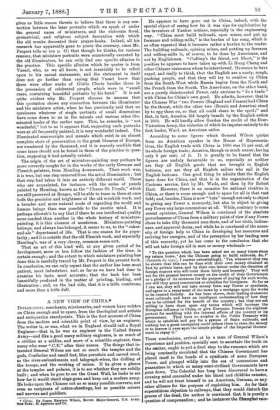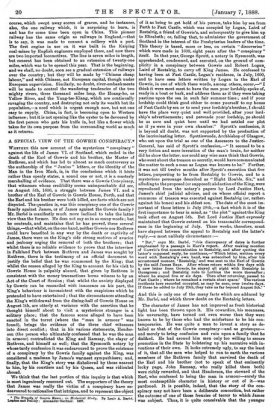A NEW VIEW OF CHINA.*
DIPLOMATISTS, merchants, missionaries, and women have written on China enough and to spare, from the theological and artistic and antiquarian standpoints. This is the first account of China from the modern and scientific point of view, by an engineer. The writer is, or was, what we in England should call a Royal Engineer—that is, he was an engineer in the -United States Army—and like a good many military engineers, is as much of a civilian as a soldier, and more of a scientific engineer, than many who wear " C.E." after their names. The things that in- terested General Wilson are not so much the temples and the gods, Confucius and small feet, blue porcelain and carved wood, as the river-embankments and telegraph-wires, the drilling of the troops, and the working of mines. If he gives a glance at the temples and palaces, it is to see whether they are solidly built ; and when he goes to see the Great Wall, he looks to see how far it would stand siege-guns and keep out a modern army. He looks upon the Chinese not as so many possible converts, nor even as recipients of cotton-sheetings, but as possible miners and navvies and pnddlers.
* China. By James Harrison Wilson, Brevet Major-General, U.S. Army. New York : D. Appleton and-Co.
He appears to have gone out to China, indeed, with the special object of seeing how far it was ripe for exploitation by the inventors of Yankee notions, especially in the engineering way. "China must build railroads, open mines, and put up furnaces and rolling-mills," is the burden of his song, which is so often repeated that it becomes rather a burden to the reader.
The building railroads, opening mines, and putting up furnaces and rolling-mills is, of course, to be done by Americans, and not by Englishmen. "Codling's the friend, not Short," is the position he appears to have taken up with Li Hung Chang and other Chinese statesmen whom he interviewed. He seems to have urged, and really to think, that the English are a nasty, rough, pushing people, and that they will try to swallow up China from the South-West while Russia begins from the North and the French from the South. The Americans, on the other hand, are a purely disinterested Power, only anxious to "do a trade" with China for China's own good. He admits, however, that in the Chinese War two Powers (England and France) had China by the throat, while the other two (Russia and America) stood by to egg them on, so that all could share in the spoil ;" and that, in fact, America did largely benefit by the English action in 1860. He will hardly allow Gordon the credit of the Ever- Victorious Army, the victories of which he imputes entirely to its first leader, Ward, an American sailor.
According to some figures which General Wilson quotes from an American speaker in the House of Representa- tives, the English trade with China in 1886 was 75 per cent, of its whole foreign trade; America, though so much nearer, having only 8 per cent, of it. It is greatly to be feared that the figures are unduly favourable to us, especially as neither are they all English goods that are brought in English bottoms, nor are they all English sailors who sail in the English bottoms. One good thing he admits that the English have done for China, and that is in the organisation of the Customs service, first by Mr. Wade, and then by Sir Robert Hart. However, there is no occasion for national rivalries in China, as there is room enough and to spare for all in that vast field; and, besides, China is now "cute" enough not only to object to giving any Power a monopoly, but also to object to giving any Power any large concessions at all. While, contrary to some recent opinions, General Wilson is convinced of the absolute powerlessness of China from a military point of view if any Power chose to take fifty thousand men there, and of her sloth, listless- ness, and apparent decay, and while he is convinced of the neces- sity of foreign help to China in developing her resources and reviving her energies, and of the perception by her leading men of this necessity, yet he has come to the conclusion that she will not take foreign aid in men or money wholesale :—
"To the question which has been asked me so many times since my return home, 'Are the Chinese going to build railroads, &c. 2' [formula da capo], I answer unhesitatingly, Yes, whenever they can be shown that this can be done with their own money obtained at first by private loans, and by their own labour under the direction of foreign experts who will treat them fairly and honestly.' They will not for the present borrow money on the credit of their Government or a pledge of its revenues for the purpose of paying for such works, nor will they grant concessions or subsidies for foreigners. So far as I can see, they will not take money from any Power or syndicate, and agree to a repayment of the same by a mortgage upon the works to be created thereby. As has been shown, their leading statesmen want railroads, and have an intelligent understanding of how they are to be utilised for the benefit of the country ; but they are not willing to have them upon any terms which will increase the European influence in China, or give European Powers the slightest pretext for meddling with the internal affairs of the country or its government. They have no surplus in the Public Treasury with which to establish and pay for a system of State railroads, and nothing but a great emergency could induce them to raise the money or to borrow it even upon the simple pledge of the Imperial Govern- ment to repay it."
These conclusions, arrived at by a man of General Wilson's experience and position, specially sent to ascertain the truth on the mutter, ought to put a final stop to the rumours which are being constantly circulated that the Chinese Government has placed itself in the hands of a syndicate of some European Power, and plunged wildly into the sea of concessions and guarantees in which so many, semi-civilised Governments have gone down. The Celestial has long been discovered to have a cunning mind concealed under his bland and childlike exterior, and he will not trust himself to an Americans German, or any other alliance for the purpose of exploiting him. As for their superstitions objection to railways, that they would disturb the graves of the dead, the author is convinced, that it is purely a question of compensation ; and he instances the Shanghai 'race- course, which swept away scores of graves, and he instances, also, the one railway which, it is surprising to learn, is and has for some time been open in China. This pioneer railway has the same origin as railways in England,—that is to say, it was made to connect a colliery with a port. The first engine in Use on it was built in the Kaiping coal-mines by English engineers employed there, and now there are two imported locomotives. The line is seven miles in length, but consent has been obtained to an extension of twenty-one miles, which was to be opened this year. That is the beginning, and we shall, no doubt, soon see a gradual extension of railways over the country ; but they will be made by "Chinese cheap labour," and with Chinese, not European capital, though under European supervision. Similarly, no doubt, river-embankments will be made to control the wandering tendencies of the two mighty rivers, three thousand miles long, the Hoang-ho, or Yellow River, and the Yang-tse-Kiang, which are continually ravaging the country, and destroying not only its wealth but its population,—a need which is urgent enough now, but not one easy to supply. China, in fact, is becoming open to Western influence ; but it is not opening like the oyster to be devoured by the first person who gets his knife in, but like a flower which takes for its own purpose from the surrounding world as much as it returns.























































 Previous page
Previous page